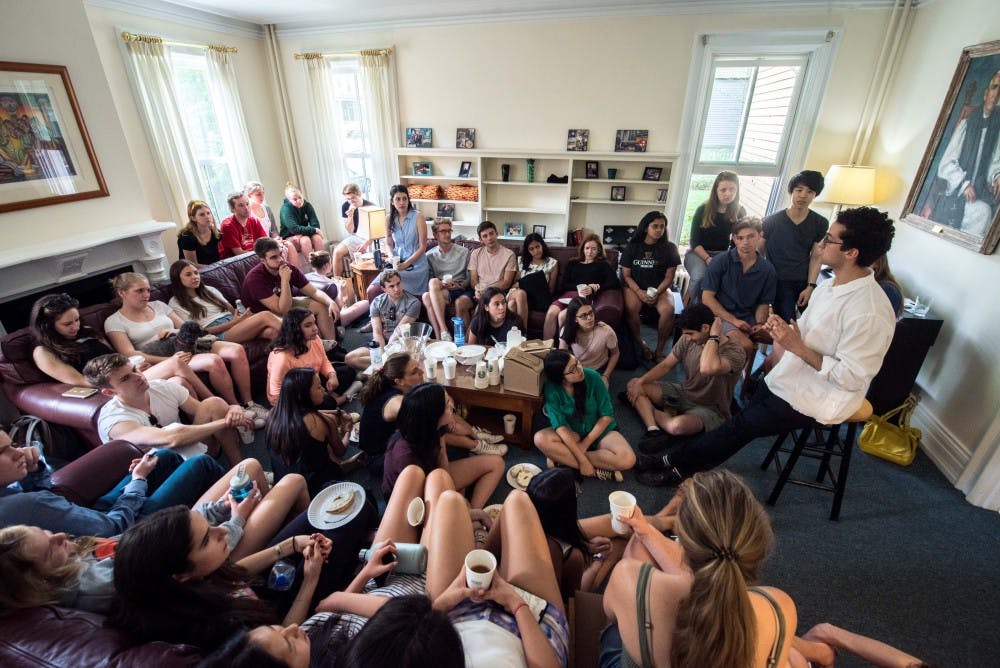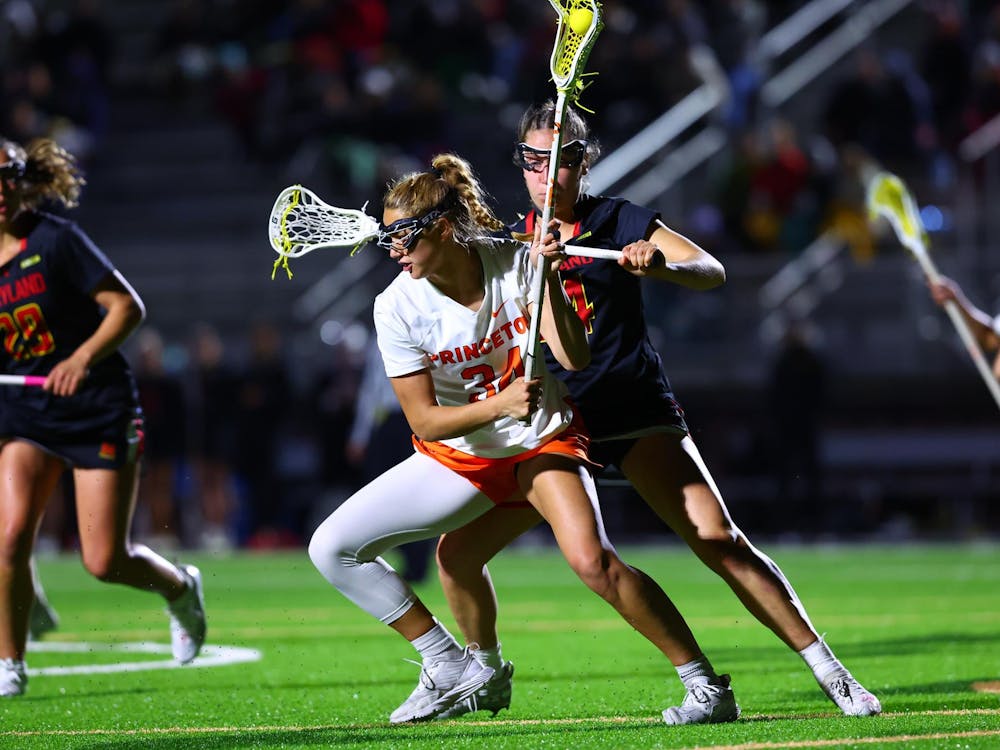Each Saturday, a group of University students packs into a room in Procter House of the Episcopal Church at Princeton. These students, however, are not affiliated with the Episcopal Church; they are part of an independent community called Workshop No.1.
Alec Gewirtz ’19 founded Workshop No. 1 at the start of the spring 2018 semester, hoping to build a space for students to engage in meaningful reflection about their lives.
“I started Workshop No. 1 because there wasn’t a venue on campus where people could reflect on how to build more fulfilling lives,” Gewirtz said. “People needed a space where they could step outside their weekly routines to recapture a sense of purpose, and for most students there wasn’t that venue.”
The weekly meetings start with a member of the group presenting an issue or idea they are encountering in their life, such as parental relationships or how professional goals line up with college lives. The presentation lasts for about five minutes and is followed by about 40 minutes of discussion among the group.
During the discussion, other members are free to share personal experiences and opinions relating to the topic or ask the presenter a question.
“The goal of these conversations is not to debate competing solutions to an issue. Instead, the conversation is grounded more in sharing our own experiences with confronting [the issue],” Gewirtz said.
“Typically, comments will end with the person asking the presenter a question in light of their experiences. My experience has been X, which has led me to believe Y, what do you think about Y?” he modeled.
Gewirtz added that while there are practical goals attached to the discussions, there is an emphasis on living with uncertainty as well.
“It’s not about rushing to solutions,” he said. “But it also doesn’t ignore the reality that people are in pursuit of solutions, so we ask questions, we try to discover new approaches to issues, with the hope that the solution is within reach, but we don’t rush to it.”
In addition to the Saturday morning meetings, Workshop No. 1 includes optional small group sessions.
“In small groups you are matched with three other people from the workshop,” Gewirtz explained. “You first choose an area of your life in which you want to make an improvement, second think of a plan for how to make that improvement, and then third get held accountable for executing that plan.”
During the first small groups meeting, participants begin with an exercise that has them place parts of their lives on a spectrum measuring level of importance. Then, they give themselves a score of how well they are performing in each aspect.

According to Gewirtz, “What this does is just bring two data points together. Something that’s very important but doesn’t have the greatest [performance] score is what that person would choose to focus on, so that will be what they discuss in the small groups going forward.”
Gewirtz participates in one of the small groups, but he does not attend most of the small group meetings. However, since these groups started this semester, he attended each of the initial meetings to help explain the opening exercise.
A project Gewirtz started his sophomore year led him to start Workshop No. 1. He created a listserv called the Sunday Letter, which focused on how to build a more fulfilling life.
Each week, Gewirtz sent an email to those interested — about a few hundred people. In the email, he would raise a question with which he was wrestling and attempt to offer an answer.
But Gewirtz decided that the email was not sufficient and needed to be replaced.
“What I decided was while there was certainly value in sending out this weekly provocation to reflection, what would be even better was a physical space where you could do more than simply read an email for a couple minutes and maybe reflect personally for a couple more minutes,” Gewirtz said.
While Gewirtz is the primary coordinator of the workshop meetings, he also works with a leadership team consisting of group members. Most of the leadership team does not have clear roles, but there is a Community Chair who helps Gewirtz brainstorm ways to foster a sense of community and organize the small group meetings.
At the first meeting of this year, members made a commitment to the group and signed a membership pledge. The pledge serves as a commitment to three main ideas: To create an atmosphere of total openness and trust, to protect the unity of the community, and to gain from our time here.
Princeton’s previous Episcopal chaplain took interest in Workshop No. 1 and offered use of the space in Procter House. Since the group has a meeting space, they have not encountered any need to become an ODUS group. Workshop No. 1 is not affiliated with ODUS or any other official University body, though Gewirtz does currently pay for refreshments and is seeking for another way to fund that.
Gewirtz explained that the workshops offer a more routine way of having conversations people might have with their friends.
“The idea is that all of us need to work through these issues,” he said. “And we do so occasionally with our friends, but we shouldn’t leave to chance that we are going to have these conversations.”
The workshops also provide a space for people to talk about their feelings without feeling nervous about expressing feelings to their friends.
“[At the workshops], there’s not guilt in dumping problems on a friend. There’s no fear of losing a friendship by saying something embarrassing. We’re just open-minded partners in thinking this through with you,” Gewirtz said.
Member Mckenna Brownell ’20 shared that the workshops fill a need in her life. She joined the workshops last spring and has appreciated participating in the conversations.
“I came a lot last year, and they were just really interesting conversations,” Brownell said. “These conversations that I think a lot of us think and have internal struggles with or debates inside our heads, but we just never vocalize because we fear that other people don’t relate to them.”
“This is truly very unique and the only space where I share thoughts like these with people I know, but also strangers,” she explained. “I have nothing [else] like this in my life.”
Members heard about the workshops from a variety of sources. Gewirtz and the leadership team attempted to send information out to various listservs and advertise on Facebook. Anyone was welcome to join.
Brownell said that she received an email from Gewirtz last year asking her to attend the first meeting, while Stephen Polcyn ’21 said he heard about it from “a fortuitous email to a listserv.”
Jackson Vail ’21 was forwarded the workshop’s fall welcome email by a friend.
“I came, not really knowing what to expect, and I found it to be a pretty cool group, and a sincere attempt to foster reflection among Princeton students, which isn’t something that people always make an effort to do here,” Vail said.
“That’s something I really value, the chance to stop and think about the world we’re inhabiting and what life is like for individuals but also specifically in the context of being Princeton University students,” Vail explained.
According to Gewirtz, the workshops do not attempt to replace religious communities. He believes that several members of Workshop No. 1 most likely belong to religious communities as well, but may not have an outlet for processing their thoughts and feelings outside the workshops.
“The idea is 100 percent not that I’m correcting any shortcomings,” Gewirtz said. “Lots of people, for example, don’t have church members with whom they can talk about a struggle they’re having, so if you’re not going to have that conversation in a small group at a church, maybe you can have something like that, obviously on very different terms, at the workshop. It’s just the lived reality that there are those people, it’s not like I’m on a crusade or anything.”
Gewirtz’s comment is underscored by the space in which the workshops take place. Not only is the room in a house owned by the Episcopal Church, but it is also a room marked by clearly religious objects. The walls are lined with bibles and images related to the church.
On the topic of Gewirtz’s personal background, he said, “I am a religion major because I think that I want to devote my life to creating values-based communities for religiously unaffiliated people of our generation.”
The name Workshop No. 1 relates to both Gewirtz’s ambitions for the current group and for the future. “I decided to include the word “Workshop” in the name because I wanted the community to be a place where people could make concrete changes to their lives, in a practical way suggested by that word,” Gewirtz said. “I decided to call it “No. 1” because it is the first of what I hope will be many similar communities that I create.”









